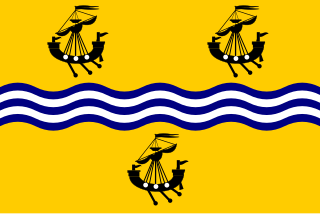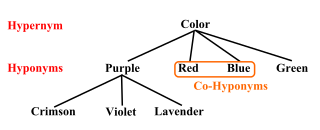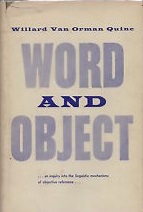
Scottish Gaelic, also known as Scots Gaelic or simply Gaelic, is a Goidelic language native to the Gaels of Scotland. As a Goidelic language, Scottish Gaelic, as well as both Irish and Manx, developed out of Old Irish. It became a distinct spoken language sometime in the 13th century in the Middle Irish period, although a common literary language was shared by the Gaels of both Ireland and Scotland until well into the 17th century. Most of modern Scotland was once Gaelic-speaking, as evidenced especially by Gaelic-language place names.

The Outer Hebrides or Western Isles, sometimes known as the Long Isle or Long Island, is an island chain off the west coast of mainland Scotland. The islands form part of the archipelago of the Hebrides, separated from the Scottish mainland and from the Inner Hebrides by the waters of the Minch, the Little Minch, and the Sea of the Hebrides. The Outer Hebrides are considered to be the traditional heartland of the Gaelic language. The islands form one of the 32 council areas of Scotland, which since 1998 has used only the Gaelic form of its name, including in English language contexts. The council area is called Na h-Eileanan an Iar and its council is Comhairle nan Eilean Siar.
In linguistics, a neologism is any newly formed word, term, or phrase that has achieved popular or institutional recognition and is becoming accepted into mainstream language. Most definitively, a word can be considered a neologism once it is published in a dictionary.

Hypernymy and hyponymy are the semantic relations between a generic term (hypernym) and a more specific term (hyponym). The hypernym is also called a supertype, umbrella term, or blanket term. The hyponym names a subtype of the hypernym. The semantic field of the hyponym is included within that of the hypernym. For example, pigeon, crow, and hen are all hyponyms of bird and animal; bird and animal are both hypernyms of pigeon, crow, and hen.

A Gaelscoil is an Irish language-medium school in Ireland: the term refers especially to Irish-medium schools outside the Irish-speaking regions or Gaeltacht. Over 50,000 students attend Gaelscoileanna at primary and second levels on the island of Ireland. Additionally, more than 13,000 students are receiving their primary and second level education through Irish in the Gaeltacht. Gaelscoileanna and Irish-medium schools in the Gaeltacht are supported and represented by Gaeloideachas and An Chomhairle um Oideachas Gaeltachta & Gaelscolaíochta or COGG in the Republic of Ireland and by Comhairle na Gaelscolaíochta in Northern Ireland. The largest patron body of Gaelscoileanna in the Republic of Ireland is An Foras Pátrúnachta, although the vast majority of schools under their patronage are at primary level.

The Gàidhealtachd usually refers to the Highlands and Islands of Scotland and especially the Scottish Gaelic-speaking culture of the area. The similar Irish language word Gaeltacht refers, however, solely to Irish-speaking areas.
Latent semantic analysis (LSA) is a technique in natural language processing, in particular distributional semantics, of analyzing relationships between a set of documents and the terms they contain by producing a set of concepts related to the documents and terms. LSA assumes that words that are close in meaning will occur in similar pieces of text. A matrix containing word counts per document is constructed from a large piece of text and a mathematical technique called singular value decomposition (SVD) is used to reduce the number of rows while preserving the similarity structure among columns. Documents are then compared by cosine similarity between any two columns. Values close to 1 represent very similar documents while values close to 0 represent very dissimilar documents.
In semiotics, linguistics, anthropology, and philosophy of language, indexicality is the phenomenon of a sign pointing to some element in the context in which it occurs. A sign that signifies indexically is called an index or, in philosophy, an indexical.
Cognitive semantics is part of the cognitive linguistics movement. Semantics is the study of linguistic meaning. Cognitive semantics holds that language is part of a more general human cognitive ability, and can therefore only describe the world as people conceive of it. It is implicit that different linguistic communities conceive of simple things and processes in the world differently, not necessarily some difference between a person's conceptual world and the real world.
Semantic change is a form of language change regarding the evolution of word usage—usually to the point that the modern meaning is radically different from the original usage. In diachronic linguistics, semantic change is a change in one of the meanings of a word. Every word has a variety of senses and connotations, which can be added, removed, or altered over time, often to the extent that cognates across space and time have very different meanings. The study of semantic change can be seen as part of etymology, onomasiology, semasiology, and semantics.
Galwegian Gaelic is an extinct dialect of Scottish Gaelic formerly spoken in southwest Scotland. It was spoken by the people of Galloway and Carrick until the early modern period. Little and a song collected in North Uist have survived, so that its exact relationship with other Scottish Gaelic dialects is uncertain.
Semantic interoperability is the ability of computer systems to exchange data with unambiguous, shared meaning. Semantic interoperability is a requirement to enable machine computable logic, inferencing, knowledge discovery, and data federation between information systems.
This article describes the grammar of the Scottish Gaelic language.
Present-day Irish has numerous loanwords from English. The native term for these is béarlachas, from Béarla, the Irish word for the English language. It is a result of language contact and bilingualism within a society where there is a dominant, superstrate language and a minority substrate language with few or no monolingual speakers and a perceived "lesser" status.
In linguistics, the term semantic domain refers to an abstract space containing all the 'meanings' of every term in a language. Since multiple words can have the same meaning, the semantic domain can also be thought of as grouping the terms based on meaning. Harriet Ottenheimer (2006), a writer in Linguistic Anthropology, defines a semantic domain as a “specific area of cultural emphasis”.

Word and Object is a 1960 work by the philosopher Willard Van Orman Quine, in which the author expands upon the line of thought of his earlier writings in From a Logical Point of View (1953), and reformulates some of his earlier arguments, such as his attack in "Two Dogmas of Empiricism" on the analytic–synthetic distinction. The thought experiment of radical translation and the accompanying notion of indeterminacy of translation are original to Word and Object, which is Quine's most famous book.
Mac Amhalghaidh is an Irish masculine surname. The name translates into English as "son of Amhalghadh". The surname originated as a patronym, however it no longer refers to the actual name of the bearer's father. The form of the surname for unmarried females is Nic Amhalghaidh. The forms for married females are Bean Mhic Amhalghaidh and Mhic Amhalghaidh. The Irish Mac Amhalghaidh has numerous Anglicised forms. The surname has been borne by at least one notable Irish family.
Macaulay, Macauley, MacAulay, McAulay and McAuley are surnames of Irish origin originating in Westmeath, Leinster anglicized from Irish Mac Amhalghaidh in the English language. The surname is also found in Scotland of distinct, but related origins due to Irish settling in Scotland. Some of the Irish Macaulay's settled in Scotland during the reign of Robert the Bruce. There are several etymological origins for the names: all of which originated as patronyms in several Gaelic languages—Irish and Scottish Gaelic. Although the English-language surnames are ultimately derived from Gaelic patronyms, the English-language surnames, and the modern Gaelic-language forms do not refer to the actual name of the bearer's father.
Dòmhnall MacAmhlaigh was a Scottish Gaelic poet and professor.

Arabic Ontology is a linguistic ontology for the Arabic language, which can be used as an Arabic WordNet with ontologically clean content. People use it also as a tree of the concepts/meanings of the Arabic terms. It is a formal representation of the concepts that the Arabic terms convey, and its content is ontologically well-founded, and benchmarked to scientific advances and rigorous knowledge sources rather than to speakers' naïve beliefs as wordnets typically do . The Ontology tree can be explored online.





